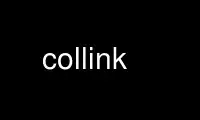
This is the command collink that can be run in the OnWorks free hosting provider using one of our multiple free online workstations such as Ubuntu Online, Fedora Online, Windows online emulator or MAC OS online emulator
PROGRAM:
NAME
Link - Link ICC profiles.
DESCRIPTION
Link ICC profiles
SYNOPSIS
collink [options] srcprofile dstprofile linkedprofile
-v Verbose
-A manufacturer Manufacturer description string
-M model
Model description string
-D description
Profile Description string (Default "inoutfile")
-C copyright
Copyright string
-V Verify existing profile, rather than link
-q lmhu
Quality - Low, Medium (def), High, Ultra
-r res Override clut res. set by -q
-n Don't preserve device linearization curves in result
-f Special :- Force neutral colors to be K only output
-fk Special :- Force K only neutral colors to be K only output
-F Special :- Force all colors to be K only output
-fcmy Special :- Force 100% C,M or Y only to stay pure
-p absprof
Include abstract profile in link
-a file.cal
Apply calibration curves to link output and append linear
-H file.cal
Append calibration curves to 3dlut
-s Simple Mode (default)
-g [src.gam]
Gamut Mapping Mode [optional source image gamut]
-G [src.gam]
Gamut Mapping Mode using inverse outprofile A2B
Simple Mode Options: -i in_intent p = perceptual, r = relative colorimetric,
s = saturation, a = absolute colorimetric
-o out_intent
p = perceptual, r = relative colorimetric, s = saturation, a = absolute
colorimetric
Gamut Mapping
Mode Options:
-i intent
set linking intent from the following choice:
a - Absolute Colorimetric (in Jab) [ICC Absolute Colorimetric]
aw - Absolute Colorimetric (in Jab) with scaling to fit white point aa - Absolute
Appearance
r - White Point Matched Appearance [ICC Relative Colorimetric]
la - Luminance axis matched Appearance
p - Perceptual (Preferred) (Default) [ICC Perceptual]
pa - Perceptual Apperance ms - Saturation
s - Enhanced Saturation [ICC Saturation]
al - Absolute Colorimetric (Lab) rl - White Point Matched Colorimetric (Lab)
-w [J,a,b]
Use forced whitepoint hack [optional target point]
-c viewcond
set source viewing conditions for CIECAM02, either an enumerated choice, or a
parameter
-d viewcond
set destination viewing conditions for CIECAM02, either an enumerated choice, or
parameter:value changes
pp - Practical Reflection Print (ISO-3664 P2) pe - Print evaluation environment
(CIE 116-1995) pc - Critical print evaluation environment (ISO-3664 P1) mt -
Monitor in typical work environment mb - Bright monitor in bright work environment
md - Monitor in darkened work environment jm - Projector in dim environment jd -
Projector in dark environment tv - Television/Film Studio
pcd - Photo CD - original scene outdoors
ob - Original scene - Bright Outdoors cx - Cut Sheet Transparencies on a viewing
box
s:surround
n = auto, a = average, m = dim, d = dark, c = transparency (default average)
w:X:Y:Z
Adapted white point as XYZ (default media white)
w:x:y Adapted white point as x, y
a:adaptation
Adaptation luminance in cd.m^2 (default 50.0)
b:background
Background % of image luminance (default 20)
l:imagewhite
Image white in cd.m^2 if surround = auto (default 250)
f:flare
Flare light % of image luminance (default 0)
g:glare
Flare light % of ambient (default 1)
g:X:Y:Z
Flare color as XYZ (default media white, Abs: D50)
g:x:y Flare color as x, y
-t tlimit
set source total ink limit, 0 - 400% (estimate by default)
-T klimit
set source black ink limit, 0 - 100% (estimate by default)
Inverse outprofile A2B Options: -k tezhxr CMYK Black generation
t = transfer K from source to destination, e = retain K of destination B2A table z
= zero K, h = 0.5 K, x = maximum K, r = ramp K (default)
-k p stle stpo enpo enle shape
p = black target generation curve parameters
-k q stle0 stpo0 enpo0 enle0 shape0 stle2 stpo2 enpo2 enle2 shape2
q = transfer source K to dual curve limits
-K parameters
Same as -k, but target is K locus rather than K value itself
-l tlimit
set destination total ink limit, 0 - 400% (estimate by default)
-L klimit
set destination black ink limit, 0 - 100% (estimate by default)
-3 flag
Create "3DLut" output file as well as devlink
e eeColor .txt file
m MadVR .3dlut file
-I b Apply BT.1886-like mapping with effective gamma 2.2 to input
-I b:g.g
Apply BT.1886-like mapping with effective gamma g.g to input
-I B Apply BT.1886 mapping with technical gamma 2.4 to input
-I B:g.g
Apply BT.1886 mapping with technical gamma g.g to input
-e flag
Video encode input as:
-E flag
Video encode output as:
n normal 0..1 full range RGB levels (default)
t (16-235)/255 "TV" RGB levels
6 Rec601 YCbCr SD (16-235,240)/255 "TV" levels
7 Rec709 1125/60Hz YCbCr HD (16-235,240)/255 "TV" levels
5 Rec709 1250/50Hz YCbCr HD (16-235,240)/255 "TV" levels
2 Rec2020 YCbCr UHD (16-235,240)/255 "TV" levels
C Rec2020 Constant Luminance YCbCr UHD (16-235,240)/255 "TV" levels
x xvYCC Rec601 YCbCr Rec709 Prims. SD (16-235,240)/255 "TV" levels
X xvYCC Rec709 YCbCr Rec709 Prims. HD (16-235,240)/255 "TV" levels
-P Create gamut gammap.wrl diagostic
Use collink online using onworks.net services
